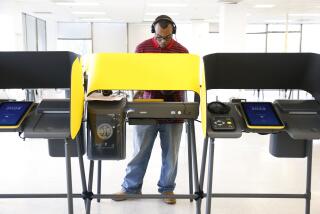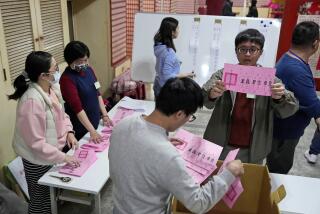Taiwanese Election Splits Local Community
The debate over the results of the Taiwanese presidential election has become so heated that local Chinese-language television news anchor April Kuan had to change her wardrobe so she wouldn’t offend anyone.
If she wore green, she’d be criticized for displaying the color of the Democratic Progressive Party. Blue, she’d be accused of wearing the color associated with the Nationalist Party. Red, well that would make her a communist.
“I just wear pink, orange or gray now,” she said.
Not nitpicky enough?
A week earlier, a viewer e-mailed to complain that an animated globe rotating in the background of the newscast was unfairly colored green, a hue chosen because of its traditional use on maps, Kuan said.
“I kindly ask of you to change the color to aid your numerous number of viewers through this difficult and mournful time,” the e-mail said.
With unbridled emotion, many Taiwanese in Southern California are refusing to shrug off the outcome of the March 20 election. Thousands have attended boisterous rallies, others have started letter writing campaigns and some have taken advertisements out in newspapers.
The outcry mainly emanates from supporters of an alliance between the Nationalist or Kuomintang Party and the People First Party, known as pan blue. The group is named after its traditional color.
Pan blue members are deeply suspicious of the final tally in an election their candidate lost. Conspiracy theories abound about why the reelected President Chen Shui-bian was slightly wounded by a gunshot hours before the polls opened and how it could have made the difference in a victory decided by fewer than 30,000 votes out of 13 million cast.
“Everyone thinks they’re a detective,” said one frustrated local Chinese-language newspaper reporter who wanted to remain anonymous for fear of angering one side or the other.
Taiwan’s two political camps are fiercely divided over how to view China, which considers Taiwan a renegade nation that must reunite with the mainland. Pan blue, which contains the old and powerful Nationalist Party, has favored a status quo with its neighbor across the Taiwan Strait. Most of its members are originally from China and fled after the 1949 Communist Revolution.
The ruling pan green, a partnership between the Democratic Progressive Party and the Taiwan Solidarity Union, is open to severing ties with China. Many of the party’s members are descendants of Taiwanese natives and still resent the Nationalist takeover led by Gen. Chiang Kai-shek half a century ago.
Pan green members defended President Chen and denounced the conspiracy theories. Nevertheless, they’ve chosen to lay low in this country. A celebration banquet at their Rosemead headquarters was canceled for fear of inciting pan blue supporters even further.
“You want to see a confrontation?” said Simon Lin, a pan green supporter who recently came back from campaigning in Taiwan. “All we’d have to do is show up at one of [pan blue’s] rallies. But why would we want to do that?”
Pan blue supporter Rose Cheung said the election has caused much discomfort in the community.
Avoiding Politics
“Everyone is labeled blue or green,” the Irvine resident said. “Even among close friends. You try not to talk about politics when you’re around people of the opposite side.”
The impassioned reaction, experts say, is typical of Taiwanese Americans who consider their country perpetually under threat from mainland China. Free elections, introduced to Taiwan in the early 1990s, are still a relatively new concept and therefore enthusiastically embraced by many.
“By the time reforms came, they were ripe for action,” said Richard Baum, director of the Center for Chinese Studies at UCLA. “It’s like a balloon. You keep filling it and filling it, and then you prick it and it bursts.”
Thousands of Taiwanese Americans took the 14-hour flight across the Pacific to vote last month, some even staying one night before returning home. In the end, more than 80% of Taiwan’s eligible voters made their way to the polls.
Last week, a rally in Chinatown could have been mistaken for a sports event. Thousands of pan blue supporters tied yellow bands around their heads and stuck mini Taiwanese flags to their cheeks. Waving American and Taiwanese flags, the protesters chanted with ferocity for Chen to admit wrongdoing.
Saturday, a symposium at the Arcadia Community Center drew several hundred more emotionally charged pan blue supporters. Several speakers broke into tears and some in the crowd at one point half-jokingly called for another bullet to take out the Taiwanese president for good.
Kurt Chang, the former head of the island nation’s secret service, flew in from Taiwan to address the expatriate community. Standing in front of a big-screen television, Chang pointed at still images of the shooting incident, questioning everything from the lack of bulletproof glass on the jeep the president stood in to the absence of surgical hats on the doctors who operated on his gunshot wound.
Questions Raised
“Why was he taken to a hospital 5.8 miles away when there was one 2 miles away?” he said to a rabid crowd that appeared to hang on his every word.
President Chen said last week that he would meet with the defeated pan blue candidate for president, Lien Chan, and his running mate, James Soong, and accept proposals for a recount of the ballots. The national leader is fending off accusations that he prevented thousands of military and police personnel from voting by calling for a national emergency when he was shot.
California is home to America’s oldest and largest Taiwanese community. Census data show that more than half of the 145,000 Taiwanese in the U.S. live in the state. Experts say those numbers are too low because thousands of Taiwanese identify themselves only as Chinese American.
Many cheered when it was reported that Henry Lee, a famous Taiwanese American forensics expert who worked on the O.J. Simpson trial, would join the probe of President Chen’s shooting. But whether or not the Taiwanese in America can affect the outcome in their homeland depends on whom you ask.
Baum, the China scholar, is skeptical that they can do anything from so far away. But Jason C. Yuan, the Washington D.C.-based representative of pan blue and a former ambassador from Taiwan based in L.A., recalled that Sun Yat Sen overthrew China’s last imperial dynasty -- the Qing -- after he gained the support of overseas Chinese.
“We need grass-roots support from the Taiwanese here,” Yuan said. “Show it to Congress. Write e-mails and faxes.”
Others have used the media. Rose Cheung, the Irvine pan blue supporter, received donations from about 50 people and took out a half-page advertisement in The Times last week headlined: “Who Shot Taiwan’s President??: A call for truth, justice and democracy.” The notice demands a swift recount of the ballots and an investigation into the shooting.
Cheung said she and her friends were devastated when the election was decided. “It’s like a death in the family,” she said.
Holding a bottle of champagne and watching the polls at home, Cheung said she felt guilty that she hadn’t flown back to Taiwan to vote. As the intrigue began to develop, Cheung said she could not accept the results.
“The Chinese have habitually been told to obey and be quiet,” she said. “The silent majority is no longer going to be silent.”
More to Read
Sign up for Essential California
The most important California stories and recommendations in your inbox every morning.
You may occasionally receive promotional content from the Los Angeles Times.











